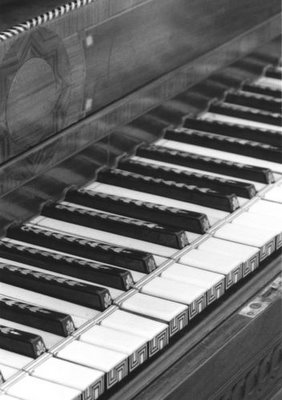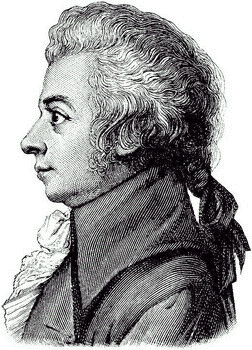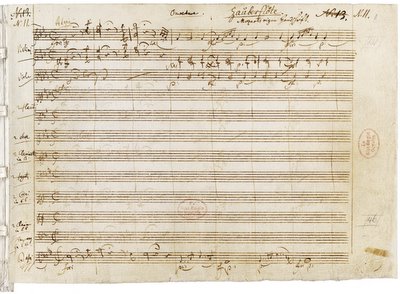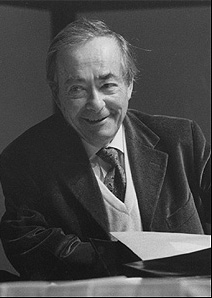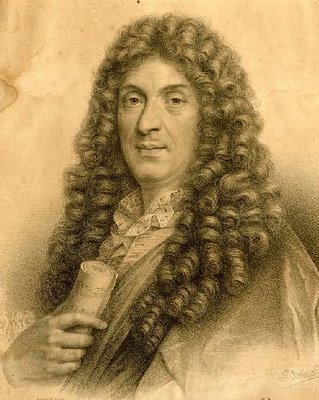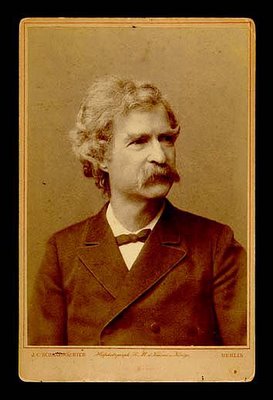Friday, January 27, 2006
Wednesday, January 25, 2006
Monday, January 23, 2006
Para ler em voz alta (33)
Largo de espáduas, de olhos carrancudo,
Rasgada a boca, orelhas derrubadas,
Ventas negras, focinho cabeludo,
Beiços caídos, garras encrespadas,
Fornidos pés, e mãos, corpo membrudo,
Seco nas ancas, gordo nas queixadas,
Curvas unhas, e dentes, rabo grosso,
Grosso, e curto nos lombos, e pescoço.
BRÁS GARCIA DE MASCARENHAS, Viriato Trágico, I, 34. [1656?]
Rasgada a boca, orelhas derrubadas,
Ventas negras, focinho cabeludo,
Beiços caídos, garras encrespadas,
Fornidos pés, e mãos, corpo membrudo,
Seco nas ancas, gordo nas queixadas,
Curvas unhas, e dentes, rabo grosso,
Grosso, e curto nos lombos, e pescoço.
BRÁS GARCIA DE MASCARENHAS, Viriato Trágico, I, 34. [1656?]
Labels: Para ler em voz alta
Sunday, January 22, 2006
Friday, January 20, 2006
Começos... (38)
It was seven o'clock of a very warm evening in the Seeonee hills when Father Wolf woke up from his day's rest, scratched himself, yawned, and spread out his paws one after the other to get rid of the sleepy feeling in their tips. Mother Wolf lay with her big gray nose dropped across her four tumbling, squealing cubs, and the moon shone into the mouth of the cave where they all lived. "Augrh!" said Father Wolf. "It is time to hunt again." He was going to spring down hill when a little shadow with a bushy tail crossed the threshold and whined: "Good luck go with you, O Chief of the Wolves. And good luck and strong white teeth go with noble children that they may never forget the hungry in this world."
RUDYARD KIPLING, The Jungle Book [1894]
RUDYARD KIPLING, The Jungle Book [1894]
Labels: Começos...
Wednesday, January 18, 2006
Sunday, January 15, 2006
Para ler em voz alta (32)
 Por JOHN FLAXMAN [1792-93]
Por JOHN FLAXMAN [1792-93]Thus, near the gates conferring as they drew,
Argus, the dog, his ancient master knew:
He not unconscious of the voice and tread,
Lifts to the sound his ear, and rears his head;
Bred by Ulysses, nourish'd at his board,
But, ah! not fated long to please his lord;
To him, his swiftness and his strength were vain;
The voice of glory call'd him o'er the main.
Till then in every sylvan chase renown'd,
With Argus, Argus, rung the woods around;
With him the youth pursued the goat or fawn,
Or traced the mazy leveret o'er the lawn.
Now left to man's ingratitude he lay,
Unhoused, neglected in the public way;
And where on heaps the rich manure was spread,
Obscene with reptiles, took his sordid bed.
He knew his lord; he knew, and strove to meet;
In vain he strove to crawl and kiss his feet;
Yet (all he could) his tail, his tears, his eyes,
Salute his master, and confess his joys.
Soft pity touch'd the mighty master's soul;
Adown his cheek a tear unbidden stole,
Stole unperceived: he turn'd his head and dried
The drop humane: then thus impassion'd cried:
"What noble beast in this abandon'd state
Lies here all helpless at Ulysses' gate?
His bulk and beauty speak no vulgar praise:
If, as he seems, he was in better days,
Some care his age deserves; or was he prized
For worthless beauty? therefore now despised;
Such dogs and men there are, mere things of state;
And always cherish'd by their friends, the great."
"Not Argus so, (Eumaeus thus rejoin'd,)
But served a master of a nobler kind,
Who, never, never shall behold him more!
Long, long since perish'd on a distant shore!
Oh had you seen him, vigorous, bold, and young,
Swift as a stag, and as a lion strong:
Him no fell savage on the plain withstood,
None 'scaped him bosom'd in the gloomy wood;
His eye how piercing, and his scent how true,
To wind the vapour on the tainted dew!
Such, when Ulysses left his natal coast:
Now years unnerve him, and his lord is lost!
The women keep the generous creature bare,
A sleek and idle race is all their care:
The master gone, the servants what restrains?
Or dwells humanity where riot reigns?
Jove fix'd it certain, that whatever day
Makes man a slave, takes half his worth away."
This said, the honest herdsman strode before;
The musing monarch pauses at the door:
The dog, whom Fate had granted to behold
His lord, when twenty tedious years had roll'd,
Takes a last look, and having seen him, dies;
So closed for ever faithful Argus' eyes!
HOMERO, trad. ALEXANDER POPE, The Odyssey , XVII [1726]
Labels: Para ler em voz alta
Friday, January 13, 2006
Thursday, January 12, 2006
Para ler em voz alta (31)
Éloge de la neige
Le silence est-il pas un aspect de la neige?
C'est par lui que la neige aveugle se protège,
Elle a le silence comme un cygne le chant;
La neige casse une jambe, cygne méchant.
Ainsi la neige au sol est par l'ange étendue...
Le cygne meurt d'amour: la neige lui est due.
JEAN COCTEAU [1923]
Le silence est-il pas un aspect de la neige?
C'est par lui que la neige aveugle se protège,
Elle a le silence comme un cygne le chant;
La neige casse une jambe, cygne méchant.
Ainsi la neige au sol est par l'ange étendue...
Le cygne meurt d'amour: la neige lui est due.
JEAN COCTEAU [1923]
Labels: Para ler em voz alta
Monday, January 09, 2006
Saturday, January 07, 2006
Para ler em voz alta (30)
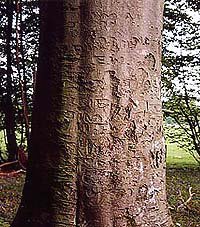 Upon the graving of her Name upon a Tree in Barnelmes Walks
Upon the graving of her Name upon a Tree in Barnelmes WalksAlas how barbarous are we,
Thus to reward the courteous Tree,
Who its broad shade affording us,
Deserves not to be wounded thus;
see how the Yelding Bark complies
With our ungrateful injuries.
And seeing this, say how much then
Trees are more generous then Men,
Who by a Nobleness so pure
Can first oblige and then endure.
KATHERINE PHILIPS [1663]
Labels: Para ler em voz alta
Wednesday, January 04, 2006
Começos... (37)
Here stretch the downs, high and breezy and green, absolutely unchanged since those eventful days. A plough has never disturbed the turf, and the sod that was uppermost then is uppermost now. Here stood the camp; here are distinct traces of the banks thrown up for the horses of the cavalry, and spots where the midden-heaps lay are still to be observed. At night, when I walk across the lonely place, it is impossible to avoid hearing, amid the scourings of the wind over the grass-bents and thistles, the old trumpet and bugle calls, the rattle of the halters; to help seeing rows of spectral tents and the impedimenta of the soldiery. From within the canvases come guttural syllables of foreign tongues, and broken songs of the fatherland; for they were mainly regiments of the King's German Legion that slept round the tent-poles hereabout at that time.
It was nearly ninety years ago. The British uniform of the period, with its immense epaulettes, queer cocked-hat, breeches, gaiters, ponderous cartridge-box, buckled shoes, and what not, would look strange and barbarous now. Ideas have changed; invention has followed invention. Soldiers were monumental objects then. A divinity still hedged kings here and there; and war was considered a glorious thing.
THOMAS HARDY, "The Melancholy Hussar of the German Legion" [1890]
It was nearly ninety years ago. The British uniform of the period, with its immense epaulettes, queer cocked-hat, breeches, gaiters, ponderous cartridge-box, buckled shoes, and what not, would look strange and barbarous now. Ideas have changed; invention has followed invention. Soldiers were monumental objects then. A divinity still hedged kings here and there; and war was considered a glorious thing.
THOMAS HARDY, "The Melancholy Hussar of the German Legion" [1890]
Labels: Começos...
